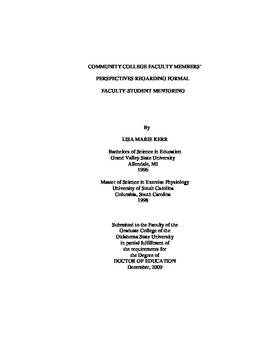| dc.contributor.advisor | Kearney, Kerri | |
| dc.contributor.author | Kerr, Lisa Marie | |
| dc.date.accessioned | 2013-11-26T08:34:37Z | |
| dc.date.available | 2013-11-26T08:34:37Z | |
| dc.date.issued | 2009-12 | |
| dc.identifier.uri | https://hdl.handle.net/11244/7460 | |
| dc.description.abstract | Scope and Method of Study: The purpose of this qualitative study was to explore community college faculty members' perceptions of tactics they perceive to foster productive mentoring process and mitigate negative mentoring experiences. Purposive sampling was used to interview 15 participants individually as well as two small groups. Institutional artifacts and field notes were also referenced as data sources. Data were coded to develop themes. The Stone Center Relational Cultural Theory (RCT) was the theoretical perspective that guided the development of this study's design, data collection, and analysis processes. | |
| dc.description.abstract | Findings and Conclusion: Analysis of the interviews, field notes, and institutional artifacts resulted in identifying six established mentoring programs in operation as well as numerous organic efforts to foster mentoring interactions between students and faculty. Additionally, 11 common themes were identified. | |
| dc.description.abstract | - Trust is vital to productive mentoring and is developed by making yourself available to the students and by allowing the students to determine the agenda. | |
| dc.description.abstract | - Tactics the participants� perceived to mitigate against negative mentoring interactions included keeping connected with the college and colleagues, as well as connecting students with others, setting boundaries for the mentoring, and moving on if the interactions subside. | |
| dc.description.abstract | - Factors that participants perceived as supporting their efforts to foster productive mentoring included: the President�s dedication, recognition received, and opportunities to engage in regularly scheduled meetings. | |
| dc.description.abstract | -Participants reported a sense that mentoring is a calling, good mentors believe in the process and the student, mentoring activates a �pay it forward� initiative, and mentoring serves as a personal touch stone. | |
| dc.description.abstract | -RCT was efficacious as a lens through which to investigate community college faculty members� perspectives of formal mentoring processes. | |
| dc.format | application/pdf | |
| dc.language | en_US | |
| dc.rights | Copyright is held by the author who has granted the Oklahoma State University Library the non-exclusive right to share this material in its institutional repository. Contact Digital Library Services at lib-dls@okstate.edu or 405-744-9161 for the permission policy on the use, reproduction or distribution of this material. | |
| dc.title | Community college faculty members' perspectives regarding formal faculty-student mentoring | |
| dc.contributor.committeeMember | Harris, Ed | |
| dc.contributor.committeeMember | Moore, Tami | |
| dc.contributor.committeeMember | Self, Mary Jo | |
| osu.filename | Kerr_okstate_0664D_10608.pdf | |
| osu.accesstype | Open Access | |
| dc.type.genre | Dissertation | |
| dc.type.material | Text | |
| dc.subject.keywords | community college | |
| dc.subject.keywords | faculty perspectives | |
| dc.subject.keywords | mentoring | |
| dc.subject.keywords | persistence | |
| dc.subject.keywords | qualitative | |
| dc.subject.keywords | retention | |
| thesis.degree.discipline | Higher Education | |
| thesis.degree.grantor | Oklahoma State University | |
